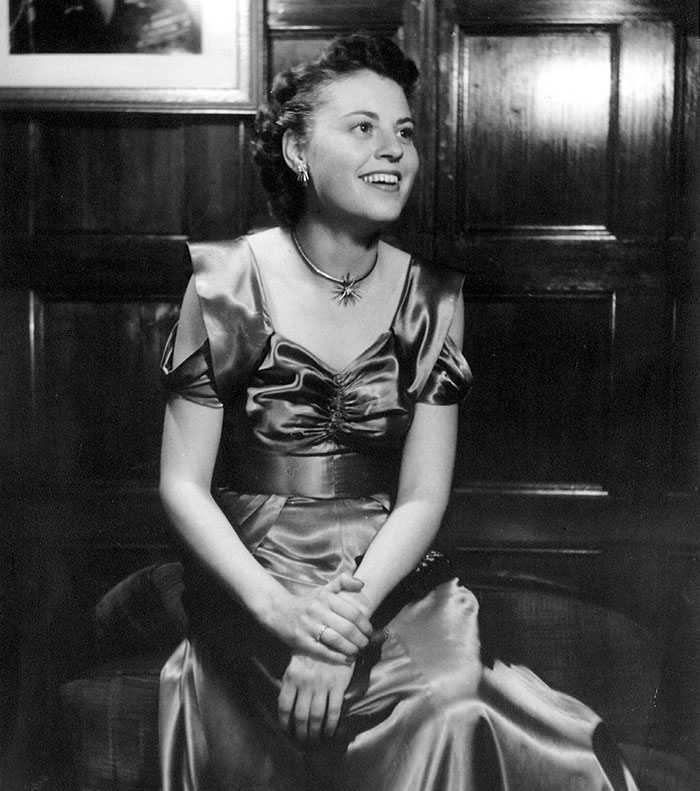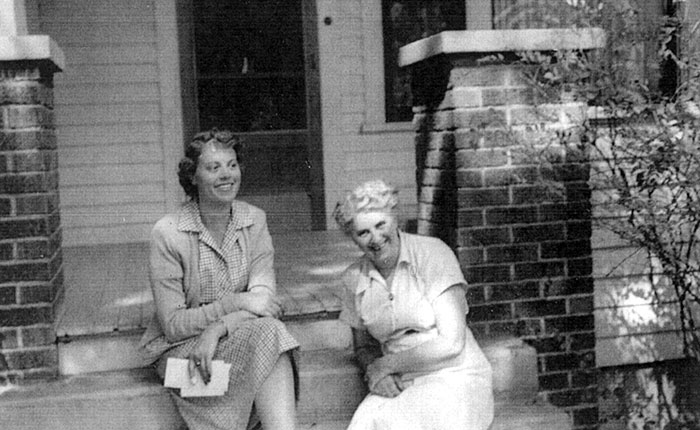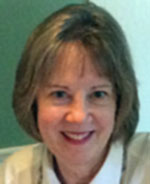On Assignment with Maxine Desilet, 1949–1955
Maxine Desilet’s letters home, accented by excerpts from her efficiency reports, paint a vivid picture of life in the postwar Foreign Service.
BY SUZANNE COFER

Maxine Desilet in Berlin, 1949.
Maxine Desilet (1918-2000) applied for the U.S. Foreign Service in August 1945. For various reasons, including hiring freezes, it was four years before she joined. She applied in Philadelphia, where she had been working during World War II as an administrative assistant with the U.S. Signal Corps. After the war, she returned home to Lewiston, Idaho.
On Feb. 16, 1949, Desilet received a telegram from the Foreign Service offering her a stenographer position. She was reminded that she would need to meet standards in clerical tests when she arrived in Washington, D.C. She would have to demonstrate a shorthand speed of 100 words per minute and a typing speed of at least 50 words per minute.
After resigning her existing position and attending to personal affairs, she reported to Washington, D.C., on April 1, 1949. She considered herself lucky, because during the postwar years thousands were applying to join the U.S. Foreign Service. Her first posting was to Berlin. What follows are excerpts from her letters home and her efficiency reports.
Assignment Berlin: 1949-1951
Secretary to the consul general
May 5 and May 8, 1949, aboard the Queen Mary
We have a beautiful stateroom. It all reminds me of a first class hotel…you can hardly tell we’re on the ocean—so smooth. The dining room is luxurious and we just finished a huge lunch.
I know now what happens to the gowns and fur stoles and capes in Harper’s Bazaar and Vogue. I feel adequately dressed during daytime, but egad—at night it’s nothing to see ermine, mink and sable wraps over original creations, which are gorgeous. The evening dress is really breathtaking. Last night we danced uphill then downhill as the ship rocked.
May 14, 1949
And so here I am in Berlin [the Berlin Airlift crisis has just been resolved]. … I arrived via bucket seat from Frankfurt. … I’ve heard enough about it, but it still was a shock to fly over the city and see the mass of ruins. It’s very large and extends as far as I could see on all sides. … Everyone here is jubilant, and also everyone here is gone! At long last they are now able to leave the city and most everyone took advantage of this one great weekend to get out of town.
I’ve heard enough about it, but it still was a shock to fly over the city and see the mass of ruins. It’s very large and extends as far as I could see on all sides.
May 18, 1949
Today is my first day at work. I will be the secretary to the Consul General. … The building itself is a big white place with marble stairs and three floors. My office looks out across the street to endless gardens. We can walk through them during lunch hour. … Berlin is, or rather, was, a beautiful city. It must be huge as the only part we see is the American sector. …
We drove down and around Saturday to the Brandenburg Gate, which is one of the boundaries into the Russian Zone. Past the huge buildings of the German government, the Chancellery, the embassies of foreign governments, all of which are now just shells.
It must be a dreadful feeling to these people who’ve lived here always to see their city like this, as it is so bad in the central part of the town, I don’t see how it can ever be repaired. We also walked down part of the shopping district where the streets were packed as Saturday displayed the first shipments of all kinds of food, etc., they haven’t had since before the blockade.
There were queues of people lined up in front of the fish stores, and crowds gathered in front of the pastries shops, all of them just looking. They look so poor and are wearing pre-war clothes that are patched and worn away. … I didn’t see one decently dressed woman. We felt quite self-conscious wearing our stateside outfits and received many stares.

Maxine Desilet with her mother, Irene, during a home visit in the early 1950s.
July 12, 1949
Last week I was invited over for lunch at the home of the United States Political Adviser for Germany [James W. Riddleberger]. He and his wife had six of us over to greet us to Berlin. It was very cozy, and we chatted and ate a fancy lunch with wine and had demi tasse in the library afterwards. I am beginning to get used to the high standard of living over here now, and don’t jump when a maid shoves a platter of food over my left shoulder.
My boss’s cocktail party for the elite was carried off to a fine finish on Saturday. After much telephoning and writing invites, etc., he invited me to attend and asked me to come over early to help with any last minute details as he doesn’t have a wife.
I stood at the door and received while he ran around the guests and kept an eye on the canapés platters and glasses to see that everyone was well taken care of. The house itself is a huge place and very lovely. … Some of the windows are stained glass, the walls are tapestried, and I lost count of the rooms.
About 200 were present from all the foreign missions, and I understand it is the party of the year. Even the Russian consul and vice consul showed up, even though they hadn’t sense enough to acknowledge the invitation.
EFFICIENCY REPORT: July 22, 1949
Miss Desilet dresses well and always presents a neat appearance. She has a pleasing and cheerful personality.
—Marshall M. Vance, Supervising Consul General, Berlin
Assignment Caracas: 1952-1954
Secretary to the chiefs of the political section and petroleum section, then secretary to the counselor for economic affairs
March 4, 1954
The city here is in the throes of the big conference [the Tenth Inter-American Conference of the Organization of American States]. … I will be able to go over this afternoon to hear [Secretary of State John Foster] Dulles give his speech. We also can listen to other international delegates speak with earphones, which is fascinating. Interpreters sit in booths above the speaker and each booth is marked “English-2,” “French-3” so if you want English you turn a little knob in the arm of the chair to No. 2 and presto, you get it in English! The interpreters listen with earphones and speak at the same time into microphones in the language of their country, and I still don’t see how they do it.
EFFICIENCY REPORT: Jan 9, 1950
Miss Desilet has an average build, with pleasant facial characteristics. She dresses neatly and appropriately at all times, and presents a general cheerful attitude about the office.
—Frances Lane, American Consul
March 22, 1954
Friday night the ambassador had a reception for the delegates to the conference. They expect to be finished the end of the week. They have all decided, except Guatemala, that communism does not pay and to gang up together to be rid of it.
People in these parts think little or nothing of McCarthy—what is the general idea in Idaho? We think he is carrying the thing just quite a bit too far, and the propaganda in other countries makes us look as though we hadn’t a thought for many serious things, but the worry of communism.
July 7, 1954
Was I ever flabbergasted. … They have in mind transferring me after home leave to Rangoon, Burma. I’ve read the post report, and it sounds fascinating. The thought of a trip halfway around the world is stimulating as hell after three years waiting for it! There are three girls stationed here now who have been to Bangkok, and loved it and say they’d give anything for my assignment. Naturally, I’ve never even given Burma the slightest thought before, so it is all new to me.
Assignment Rangoon: 1955
Secretary to the ambassador
January 19, 1955
I don’t think I’d be able to ever keep a job in an office like some people do for years and years as the only thing that keeps me interested in working is the traveling around to different spots. …
I do have the sweetest boss [Ambassador Joseph C. Satterthwaite] right now—he looks like Mr. Peepers on TV—and it is always a pleasure to work for someone with brains—so many have none.
EFFICIENCY REPORT: December 1, 1952
The conduct and deportment of this employee is outstanding and fully representative of the highest standards of the Foreign Service. She represents the best type of American young lady: sensible, stable, cheerful and loyal. Her devotion and dependability to her job is one of the strongest supports to her superior. …
Miss Desilet could fill any position of a secretarial nature or as a competent assistant to an officer at any post. She has initiative, judgment and foresight of a high degree, which enables her to adapt herself intelligently to any problem. … She is mature, competent in her work, stable and devoted. Her conduct within and outside the embassy shows her to be a young lady of fine background, high moral standards and sound character. Her constant cheerfulness and good humor, even under trying conditions, makes it a pleasure to work with her and to have to depend upon. She would do well in a secretarial position requiring a high degree of competence, loyalty and understanding of the basic ideals of the Foreign Service.
—Franklin W. Wolf, Economic Counselor, Embassy Caracas
February 25, 1955
[Secretary] Dulles arrives tomorrow and I’m on duty all day. Have to go out to the plane to meet him and record all his pearls of wisdom. Then press conference. I have an engraved invitation from the President of Burma to a Garden Party also. My first Chief of State invite. All is bedlam here in preparedness. On top of that [Member of Congress] Chester Bowles is here and Senator Margaret Chase Smith arrives Monday.
[From April 14, 2000, Cofer interview with Desilet] I went with other embassy officials to the airport to greet Dulles. He descended the stairs of the plane with 7 or 8 men, and “they were all drunk.” He brought his own secretary, Phyllis. Dulles held a press conference. During that time, his secretary informed me she was in Burma as a tourist. I had no previous experience of taking notation at meetings of this level, but me and another secretary at the embassy who had worked at an international conference in Geneva agreed to work together to handle whatever was required, without Phyllis.
It was 100 degrees outside. The meetings began with Dulles and President Ba U and many other officials set up in a large school auditorium somewhere in Rangoon. There was no airconditioning. I took notes with a pencil and remember the sweat running off my hand. At the conclusion of the meeting, we went to the embassy to type our notes. Dulles came to the embassy as well and was walking up and down near my desk, asking about every five minutes, “Are you finished yet, girls?”
Dulles wanted to take the typed notes with him to the president’s reception. I finally told Dulles we could type a lot faster if he would stop interrupting. I told him I would bring the typed notes to him at the reception. So Dulles left. We managed to finish the typing and, after freshening ourselves, we went to the reception to present the notes to Dulles. He reviewed them, nodded his approval with a smile, and shared a copy with the international press corps waiting nearby.
May 17, 1955
Last night I went to a reception and saw Helen Keller. It was quite a moving incident, and we were all thrilled to finally see someone we’d heard about all of our lives. She sat on the stage with her companion, Miss Thomson, and gave a speech. Her voice is clear enough if you were talking with her alone, but over the mike it is not effective, so Miss Thomson repeated after her. Miss Thomson herself is a wonder, and how they do it is beyond me. They both looked quite trim, and while the mayor gave a welcoming speech, Miss Thomson gave it to Miss Keller by tapping her hand. It was really a moving sight to see them, and Keller told the government people here that it was appalling the little that has been done to aid the blind in Burma, and after her scolding, [Prime Minister] U Nu invited her to stay in his guest house, which they are doing, with the rented air-conditioner breaking down every three hours or so.
I find that people who travel around a lot—and this has helped me considerably—can take people as they come and appreciate the good things in them instead of always tearing them apart and being critical.
June 2, 1955
I have found a very interesting male companion—newspaperman from Nevada—who will only be here a short time [Denver Dickerson, her future husband]. He’s going back home and run for the Senate! His father used to be governor of the state. We play a lot of Scrabble, and I must say I’m no match and must pick up on my vocabulary immediately.
September 26, 1955
I find that people who travel around a lot—and this has helped me considerably—can take people as they come and appreciate the good things in them instead of always tearing them apart and being critical. Everyone doesn’t have to be American, a Democrat, or Catholic, just because we are.
Resignation from the Foreign Service
In late 1955 Maxine Desilet resigned from the Foreign Service and returned to America via India, Egypt, the Holy Land, Italy and France, and then on to New York City and Washington, D.C., before arriving at her parents’ home in Lewiston, Idaho. In 1956 she married Denver Dickerson.
Read More...
- Women Who Make a Difference: Reflections of a Foreign Service Wife in 1982 by Patricia B. Norland (The Foreign Service Journal, May 2015)
- Our Woman in Havana by Vicki J. Huddleston (The Foreign Service Journal, June 2014)





